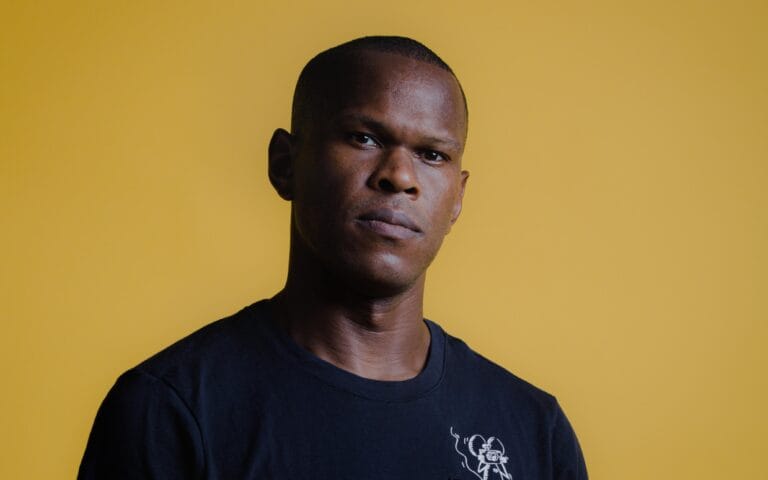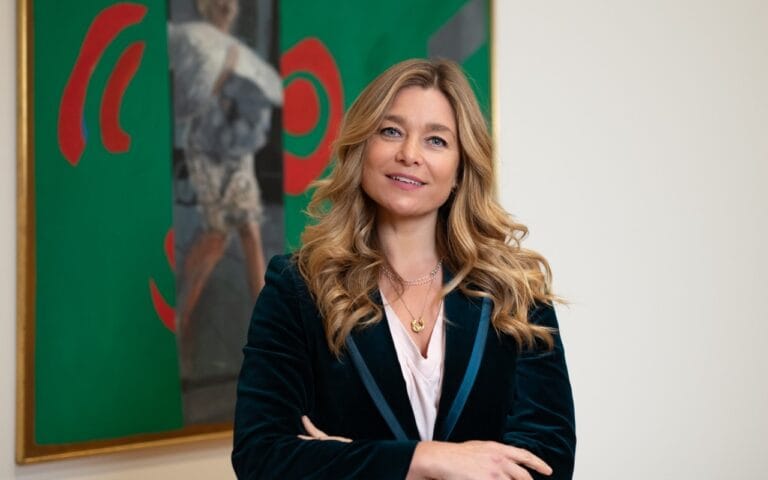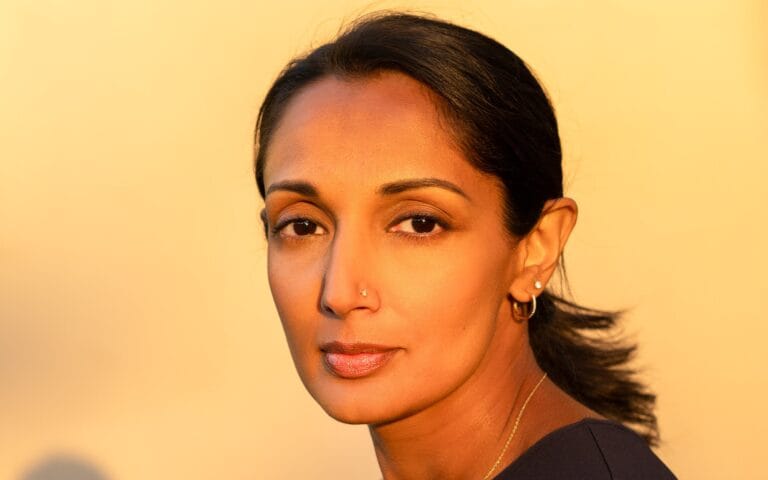In the ethereal world beneath the waves, few have mastered the art of freediving with the grace and determination of Li Karlsén. The Swedish athlete has redefined the boundaries of human capability, and established herself as one of the world’s premier freedivers, capable of reaching depths below 70 meters, distances beyond 200 meters, and holding her breath for more than 6 minutes.
Based between sunny Mauritius and Sydney, Karlsén’s path to the ocean’s depths is as remarkable as her achievements. A former Army Captain in the Swedish Armed Forces who took part in international missions, she found her calling under the waters after surviving a devastating car accident that claimed her best friend’s life and ended her own dreams of becoming a pilot. Hers is a story about rising from the depths.
Karlsén’s recent accomplishment, completing the longest human dive ever conducted under pack ice in Greenland, stands as testimony to her extraordinary skill and determination. Beyond this, she’s also a civil rights defender and entrepreneur, launching a brand of health optimising supplements called BKM, and dedicating herself to helping others overcome their fears and reaching their full potential.
“My next mission is not about depth, distance, or dopamine, but about sharing,” she explains. As she continues to travel, explore nature, dive with whales and dolphins (also teaching others to do so), Karlsén is showing the profound human capacity for reinvention and transcendence.
Your favourite restaurants in Sydney?

Sydney’s restaurant scene is pure magic, there’s such a wide range of styles, moods, and flavours that it’s impossible to get bored. One of my all-time favourites is Mr. Wong, a beautiful Cantonese restaurant tucked down a dimly lit alley just off the busy city streets. It was actually the first place my boyfriend took me when I arrived in Sydney, which makes it even more special. Despite seating over 200 guests and offering more than 80 dishes, it somehow manages to feel intimate and elegant. For something more low-key, my go-to is our cozy neighbourhood spot, Next Door. It’s the sister restaurant to Margaret and sits literally next door on the corner of Bay Street and Guilfoyle Avenue. Their CopperTree American Cheeseburger is hands down the best burger I’ve ever had, no exaggeration!
What do you love about Australia?
What I love most about Australia is the deep connection to nature that’s woven into everyday life. Even in the heart of Sydney, you’re surrounded by green spaces, and just minutes away are endless beaches and rolling waves. There’s something really special about waking up at 5am, year-round, and heading down for a swim, whether the water’s warm or cold, you’re sharing the ocean with surfers catching waves, centennials gliding past you, and dogs running free on the grass. During the winter (summer in Europe) you can see the humpback whales breaching out at sea from the beach, usually surrounded by dolphins and even seals playing near the shoreline. For someone who loves the ocean and its creatures, that’s just pure heaven.
Then it’s off to work, only to return to the outdoors afterward for a barbecue with friends, back by the beach. I also really appreciate how strong the domestic food market is, so much is locally grown and produced, and you really get a sense of where your food comes from. The health and wellness scene is thriving too, there’s a gym, pilates studio, or cold plunge spot on nearly every corner. It’s a lifestyle that makes you feel grounded, energised, and alive.
Why did you choose Mauritius as a base?

I’ve spent most of my life searching for a place where I could be close to nature and the ocean, somewhere I could both recover and explore. Mauritius feels like that place. It’s a peaceful island, tucked away in the middle of the Indian Ocean, still relatively untouched by mass tourism and holding a calm, feminine energy that’s hard to describe but easy to feel.
There’s also a deeper resonance for me. According to legend, Mauritius was part of Lemuria, a sister civilization to Atlantis, where matriarchal values and harmony with nature shaped everyday life. Whether myth or memory, that energy lives on in the land. It’s the lifestyle I always dreamed of, waking up to dive with marine mammals, climbing a mountain by sunset, and lighting a fire with friends under a full moon. It’s not just beautiful, it feels like home.
Hidden gems in Mauritius?
One of my favorite hidden gems is the stretch of small, tucked-away coffee spots near Tamarin Beach. After an early morning surf or swim, there’s nothing better than grabbing a strong espresso or fresh juice barefoot, still salty from the ocean, while watching the waves roll in. The vibe is relaxed, local, and effortlessly soulful.
Another treasure is up in the mountains, places like Lakaz Chamarel Lodge. It’s nestled in the lush hills of Chamarel and feels like a secret sanctuary. From there, you get one of the most breathtaking sunset views on the island, looking out over forests, ocean, and sky blending into gold. It’s the kind of place that reminds you how much beauty is still untouched here.
And for those who love a bit of adventure, the hiking trails in Black River Gorges National Park are absolutely amazing. You can weave through native forests, spill out onto dramatic lookout points, and feel completely immersed in the wild heart of Mauritius, it’s nature at its purest and most powerful.
What’s your neighbourhood routine there?
I live on the west coast of Mauritius, where the rhythm of life is slow and deeply connected to the natural world. My neighbourhood stretches between Tamarin and Black River, two coastal villages that feel more like a community than a destination. Tamarin is known for its laid-back surf culture, salt pans, and dolphin-filled bay, while Black River has more of a gentle buzz, with local cafés, fruit stalls, fishermen, and the occasional monkey crossing the road at sunrise. Mornings usually begin early with a swim, a freedive, or a paddle out with the dolphins that often visit our coastline. The sea here is warm and wild. After that, I might stop by a small café for a fresh juice, catch up with neighbours, or visit the market to pick up local produce, mangoes, papayas, herbs, fresh fish.
Le Morne sits just further south, a majestic mountain rising dramatically from the lagoon. It’s one of Mauritius’ most iconic landmarks, not just for its beauty, but for its history. It was once a refuge for escaped slaves, and in 1835, after slavery was abolished, a tragic misunderstanding led many to jump from the cliffs in fear of recapture. Today, Le Morne is a UNESCO World Heritage Site, both a place of remembrance and resilience. It carries a deep emotional weight, but also a powerful, sacred energy.
Being able to walk barefoot, dive deep, watch the sunset painting the mountains pink, and gather with friends for a beach fire or starlit dinner, it’s more than routine. It’s a way of life I deeply cherish.
How did your military experience as an Army Captain prepare you for the mental challenges of extreme freediving?
My time in the military taught me that presence isn’t optional, it’s a survival skill. As an Army Captain, I learned early on that you can’t carry the stress of yesterday into today’s mission. Whether you’re stepping into a war zone or diving under the pack ice in Greenland, your nervous system doesn’t distinguish between emotional and physical stress, it just knows your homeostasis is under threat.
That’s why de-stressing before adding stress is crucial. In both environments, the margin for error is razor-thin. If your mind is anywhere but fully present, you risk losing control. Before a deep dive under the ice, just like before a military operation, I go through a mental clearing process, quieting the noise, focusing the breath, anchoring in the now.
Freediving under the ice in Greenland, with no direct way to surface, is a test of everything you’ve trained for. Just like facing an adversary in a conflict zone, it’s not about brute force, it’s about calm under pressure, precision, and trust in your training. That ability to stay composed in extreme conditions was forged through years of discipline, intense preparation, and learning to master my own physiology, lessons the military gave me, and freediving continues to deepen.

Does travel help the creative juices and if so how?
Absolutely, travel fuels creativity by keeping me relentlessly curious! Exploring new places, cultures, languages and perspectives challenges my assumptions and awakens parts of me that routine can dull. When I stop feeding my creativity, I start to feel stagnant, like something essential is drying up. But through all the journeys, I’ve also realized that paradise isn’t a place, but a space within. Exploring helps me find that space within, again and again.
Favourite hotel anywhere in the world?
One of my favourite places to stay in the world is on Nosy Iranja, a remote island in the Indian Ocean off the northwest coast of Madagascar. You stay in simple bungalows right by the beach, eat freshly caught fish, and wake up with the sunrise to walk the sandbar that only appears at low tide, connecting two islands in peaceful solitude. It’s pure magic, untouched and deeply grounding.
Three favourite places to dive in the world?
Mauritius is my recovery island, warm, gentle, and deeply connected to nature. It’s where I dive to reconnect, reset, and restore. Greenland is the opposite, raw, cold, and extreme. Diving under the pack ice there is like entering another world: silent, vast, and humbling. And Indonesia is pure magic underwater. Its reefs are alive with colour, and the deep blue stretches endlessly. It’s a playground for both depth and beauty.
Three favourite (non-diving related) cities to travel in the world?
Stockholm is my hometown and will always have my heart. Built on islands, it’s a blend of natural beauty, rich history, and some of my favourite restaurants in the world. Portofino in Italy is pure Mediterranean charm perched by the sea, full of character, and perfect for long lunches overlooking the water. Noosa in Australia has that laid-back beach town feel I love, with surf breaks, tennis courts, and a lifestyle that makes it easy to stay active and relaxed.

What unique challenges did you face during your record-setting dive under the icebergs in Greenland?
We were standing on the pack ice of a remote fjord off the east coast of Greenland, in the dead of winter, March, when everything is at its most unforgiving. The air was brutal, the water below was –2°C, dark and shifting, with strong currents that had already clogged the exit hole we’d cut through the ice. There were no safety lines, no divers waiting below. Just me, the ice, and the unknown. Polar bears had been circling our camp the same morning, reminding us just how wild and raw this place truly is.
I was preparing for what would become the longest under-ice dive ever completed by a human being. Every part of me, physical, mental, emotional, had to be fully present. But just before the dive, the director of the documentary, shivering and visibly overwhelmed, looked at me and said, “You can’t do this. It’s impossible. You have to see this as a failed dive.” The crew was cold, time was running out, and at that moment, he had already given up. And for a split second, I almost did too.
But I didn’t fight the thought. I didn’t argue with it or try to force it away. I simply acknowledged it and chose not to believe it. That’s something I’ve learned in both the military and freediving: you don’t master fear by resisting it, you master it by observing it without attachment. Psychologists call it “defusion”, the ability to create space between you and your thoughts, and to act in alignment with your values rather than your fears. That dive wasn’t just a test of physical endurance. It was a moment of mental separation, from the noise, the doubt, and the limits others try to place on you. And I think that’s what made it possible.

Describe the specific techniques you developed to extend your breath-hold capacity to over 6 minutes?
Extending my breath-hold beyond six minutes (my personal best is 7 minutes!) came from training both my body and mind to tolerate rising CO₂ levels and low oxygen, primarily through CO₂ tables. CO₂ tables are structured breath-hold exercises that train your body to tolerate high levels of stress, specifically elevated CO₂, a state known as hypercapnia. The goal is to increase your CO₂ tolerance while teaching your mind to stay calm in the face of rising discomfort. In practice, this means training your muscles and nervous system to function under extreme internal stress, and more importantly, to recover quickly from it. That recovery capacity is what separates a true breath-hold athlete from someone who can simply hold their breath once until they faint. To be blunt, anyone can push themselves to the limit once, but real performance is about reaching your edge repeatedly without burning out your nervous system or getting injured. Over time, this kind of training builds not only physical adaptation, but deep mental resilience and control.
But freediving isn’t really about how long you can hold your breath, it’s about how efficiently you use oxygen while moving. A deep dive to 80 meters takes around three minutes (80 seconds down, and 80 seconds up), but you’re constantly working against pressure, cold, and depth. What matters is how well your cardiovascular system performs, how your body manages CO₂ and lactic acid, and how calmly you move through stress. That’s the real secret to depth: efficiency, not duration.

Most profound moment underwater?
My first encounter with a whale, a giant female sperm whale. She passed by me effortlessly, looking at me like I was a curious mosquito, despite all my freediving gear and readiness to prove myself. She didn’t care. She barely moved, yet was still faster than I could ever be.
I swam after her with everything I had, losing track of time, space, and even my dive buddies. She began diving down into the deep, and I followed, thinking, finally, this is my comfort zone, I can also dive deep! Not as deep as hers, but deep enough. Around 40 meters down, she started clicking, using echolocation, her codas. It’s how they talk, scan, and understand. That sonar hit me like a wave through my entire body, not in a frightening way, but in a deeply calming one.
I could feel her seeing me, not just my body, but inside me. My lungs, my ribs, maybe even my emotions. And at that moment, something cracked open. I felt completely seen by another being. I cried underwater, mask flooded, vision blurred, but it was worth it. That meeting dissolved my fear of deep water, darkness, and ocean creatures. It taught me that fear and freedom are both choices. Since then, every time I dive, I imagine a clicking whale by my side, calm, powerful, and free. And I try to embody the same.

What made you co-found your company BKM?
BKM was born out of both frustration and necessity. For years, I was taking up to 30 pills a day, many with vague or inaccurate ingredient lists, and most based on research conducted primarily on men. I realized the supplement industry wasn’t just failing women, it was misleading them. Something had to change. So I set out on a five-year journey of research, experimentation, and refinement to find what truly works for men and women’s bodies, minds, and hormones.
The result is a range of five unisex products focused on deep, cellular recovery, each created with purpose. My personal “baby,” BKM Harmonized, is crafted specifically for women: a science-backed formula designed to support hormonal balance, muscle health, energy, and resilience through every stage of life. What sets BKM apart? It’s made in Sweden with no shortcuts, no empty promises, and no unnecessary ingredients, created for men and women from the very beginning, not as an afterthought. This isn’t just supplements, it’s the solution I was desperately looking for when I needed it most. And now, it’s here for others who do too.
What is your next big challenge?
I’m finalising Ice Queen, the documentary about my journey of healing and breaking a world record under the ice in Greenland. It’s a deeply personal project, and my hope is that by sharing it, I can help others find their own alchemy of healing and living fully.
At the same time, I’m working on completing my book about resilience and recovery, drawing from my experiences across the military, the ocean, and deep inner work. And beyond that, I’m committed to continuing my support for organisations like the UN Ocean Decade and Passion for Ocean, helping to protect and serve the natural world while encouraging others to step into their own role as guardians of the planet.
Travel splurge you’ll never regret?
While serving onboard the Swedish battleship HMS Carlskrona with EUNAVFOR in the Bay of Aden, chasing pirates off the coast of Somalia, we had a rare 24-hour rest stop while bunkering in Oman. I didn’t waste a second, I headed straight into the desert on a dirt bike with a local guide, spent the night in a Bedouin tent, and listened to the desert’s different layers of silence. That splurge, on solitude, adventure, and stillness, is something I’ll never regret.
Dream vacation, not yet fulfilled
I dream of diving in the Galápagos and Baja California, Mexico, places where marine life is still wild, diverse, and deeply protected. The chance to be surrounded by so many species of mammals, to simply observe them and exist as a quiet visitor in their universe, feels sacred. It’s not about chasing a thrill, it’s about witnessing a world where nature still leads, untouched and undisturbed by us.






